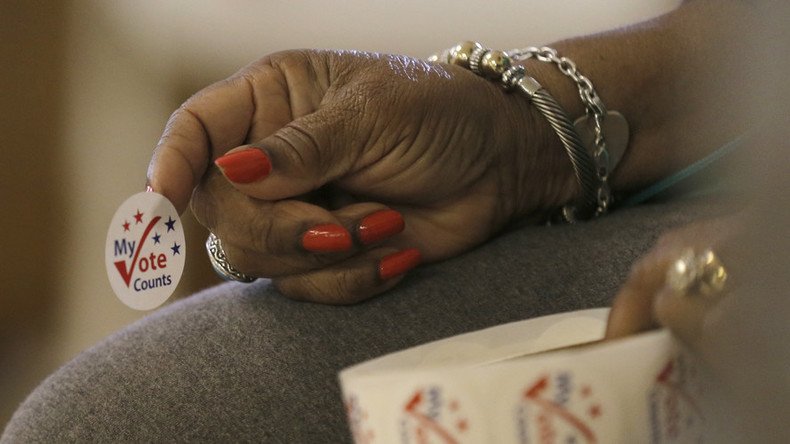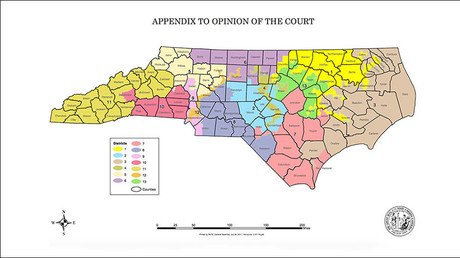Supreme Court rules more N. Carolina districts illegally gerrymandered on race

The Supreme Court has yet again waded into the fray of North Carolina politics, ruling once more that Republicans created racially gerrymandered districts. However, the court did not see a need for special elections once a new legislative map is in place.
The high court’s ruling, in North Carolina v. Covington, throws out the state legislative districts, because they were illegally based on race by packing black voters into districts and diminishing their political power. The ruling comes exactly two weeks after the Supreme Court rejected the boundaries of two congressional districts in the Tar Heel State, because they were illegally gerrymandered.
Gerrymandering is the process of redistricting to favor one party or race. Redistricting occurs the year following the decennial US Census. In recent statewide and federal elections, North Carolina was split along partisan lines, but Republicans held 10 of the 13 congressional districts in 2016, compared to only six in 2010. The GOP now holds 35 of 50 state Senate seats and 74 of 120 state House seats.
The Supreme Court upheld a lower court’s decision that nine North Carolina Senate districts and 19 state House districts were drawn to diminish the voting power of minorities in violation of the Equal Protection Clause of the 14th Amendment of the US Constitution.
With no recorded dissents, however, the justices overruled the three-judge District Court panel’s remedial order from August 2016 that the state redraw the boundaries by March 2017 and hold special elections this year. The winners of those districts would have served one-year terms.
The lower court ruled: “While special elections have costs, those costs pale in comparison to the injury caused by allowing citizens to continue to be represented by legislators elected pursuant to a racial gerrymander.” The Supreme Court sided with the state argument, however, that the District Court “failed to meaningfully weigh any equitable considerations,” the justices (wrote) in the per curiam (unanimous) opinion.
They instead remanded the case back to the District Court and called upon the three-judge panel to consider “the severity and nature of the particular constitutional violation, the extent of the likely disruption to the ordinary processes of governance if early elections are imposed, and the need to act with proper judicial restraint when intruding on state sovereignty.”
The panel’s previous ruling, the Supreme Court justices wrote, “would appear to justify a special election in every racial-gerrymandering case – a result clearly at odds with our demand for careful, case-specific analysis.”
While the ruling was an overall win for civil rights groups and minorities in the Tar Heel State, the loss of the special elections this fall is a blow for Democrats, as it could have allowed the party a chance to reduce the Republicans’ veto-proof majorities in the state legislature before 2018, helping out the newly elected Democratic governor.
In November, North Carolina voters opted for Democrat Roy Cooper over the incumbent Republican governor, Pat McCrory. The state legislature responded by stripping away many gubernatorial powers during a lame-duck special session in December. A state Superior Court judge reinstated many of those powers later that same month.
The people should be able to choose their representatives in fair, competitive districts -- not the other way around.
— Governor Roy Cooper (@NC_Governor) June 5, 2017
"Whether the election is November 2018 or earlier, redrawing the districts is good for our democracy by leveling the playing field for free and fair elections," Cooper said in a statement. "The people should be able to choose their representatives in competitive districts instead of the representatives being able to choose the people in lopsided, partisan districts."
Monday’s ruling was the third one from the Supreme Court in recent weeks that involved North Carolina’s 2011 redistricting map. Along with the May 22 decision, last week the justices sent a different lawsuit, that challenged both the state and federal legislative districts in North Carolina, back to the state Supreme Court for a third time. The state Supreme Court had upheld the 2011 map twice.
Last year, a federal appeals court struck down a North Carolina law requiring voters to present a photo ID before casting ballots in elections, finding that certain provisions in it were “enacted with racially discriminatory intent.”
Police stumble on $500mn opium poppy field in North Carolinahttps://t.co/3BzDHq85yL
— RT America (@RT_America) May 27, 2017













